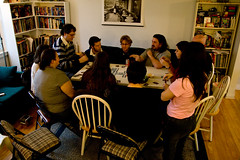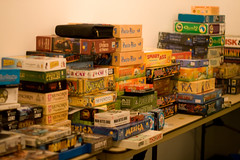Misleading products... or just a misleading article? CBC Marketplace fails at research.
So, I was catching up on the news from home when I saw this article on the 10 worst household products for greenwashing. As it happens, I know something about #1 here, because the landlords arranged to have a similar product used around our house and we were curious. Here's what marketplace says:
"Banned from your backyard, but OK for your bed?" DOOOOOOOOM.
If the CBC marketplace folk had done their research, they could have *easily* found out that the active ingredient here is, as promised, not known to be dangerous to mammals. It is an insecticide, so obviously it's bad for insects. But why can't it be used outside? It's also very bad for aquatic life, so the concern is that if used outside, it will get washed away in rain and end up in our waterways. This would be a Bad Thing. And that's why you're not allowed to use it in your backyard.
But unless you're Aquaman, or plan to bring your goldfish to bed, it is indeed pretty safe to use on bedding.
One website I found noted that after being fed high doses of pyrethrums for 2 years, rats were mostly fine with some minor liver damage (as one might expect for many intentional overdoses of anything). When forced to inhale the stuff for 30 minutes a day, there was some very minor lung irritation. Basically, don't try to kill yourself with it and you'll probably be fine. Heck, even if you try to kill yourself with it you'll probably be mostly fine.
This whole "banned from your backyard/ok for bed" doom and gloom implication is utterly misleading and uninformed. And this ignorance is really embarrassing: I found most of my information about Pyrethrums (the class of chemicals involved) using a couple of google searches and then confirmed with my sister who happens to be an expert in the field, but she pointed out that I can get all the same information via Health Canada's website. These should be very easy for the CBC Marketplace research team to find and read.
I don't know anything about the other products being discussed, but I'd take what they say with a pretty healthy dose of skepticism.
1. Raid EarthBlends Multi-bug Killer
With an insecticide derived from the chrysanthemum flower, Raid EarthBlends Multi-bug Killer touts itself as an alternative insect control solution. Despite its naturally derived component, the label warns users to avoid contact with skin and clothes, and not to inhale the mist when spraying it.
"A lot of things in nature are actually dangerous and toxic," said Vasil. "Not all natural things are good for you. And this is a perfect example."
The product states it can be used for bed bugs, despite that in many parts of Canada, homeowners are banned from using such pesticides on their lawns. "Banned from your backyard, but OK for your bed?" questioned Vasil.
In a statement, the maker, SC Johnson, said it is "committed to using sustainable ingredients in our products" and the products are "safe and effective when used as directed."
"Banned from your backyard, but OK for your bed?" DOOOOOOOOM.
If the CBC marketplace folk had done their research, they could have *easily* found out that the active ingredient here is, as promised, not known to be dangerous to mammals. It is an insecticide, so obviously it's bad for insects. But why can't it be used outside? It's also very bad for aquatic life, so the concern is that if used outside, it will get washed away in rain and end up in our waterways. This would be a Bad Thing. And that's why you're not allowed to use it in your backyard.
But unless you're Aquaman, or plan to bring your goldfish to bed, it is indeed pretty safe to use on bedding.
One website I found noted that after being fed high doses of pyrethrums for 2 years, rats were mostly fine with some minor liver damage (as one might expect for many intentional overdoses of anything). When forced to inhale the stuff for 30 minutes a day, there was some very minor lung irritation. Basically, don't try to kill yourself with it and you'll probably be fine. Heck, even if you try to kill yourself with it you'll probably be mostly fine.
This whole "banned from your backyard/ok for bed" doom and gloom implication is utterly misleading and uninformed. And this ignorance is really embarrassing: I found most of my information about Pyrethrums (the class of chemicals involved) using a couple of google searches and then confirmed with my sister who happens to be an expert in the field, but she pointed out that I can get all the same information via Health Canada's website. These should be very easy for the CBC Marketplace research team to find and read.
I don't know anything about the other products being discussed, but I'd take what they say with a pretty healthy dose of skepticism.




